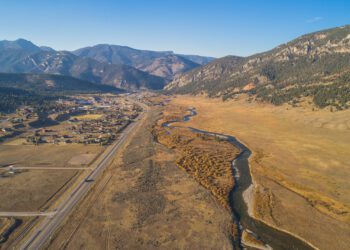Why renewing Big Sky’s resort tax is important for our future
By Daniel Bierschwale EBS COLUMNIST
When I think of the future, Buzz Lightyear’s famous catchphrase, “To infinity and beyond!” comes to mind. While the Big Sky resort tax doesn’t reach infinity, its extension is vital for our community’s future. For over 30 years, this tax has shaped Big Sky, funding critical infrastructure, services, and community projects. To continue building a vibrant and resilient community, renewing and extending the resort tax is essential.
The resort tax was introduced in response to the strain tourists placed on local infrastructure and emergency services. First implemented in 1992, it was designed to relieve property taxes by ensuring that visitors contribute to funding essential infrastructure and services. Recognizing its importance, the community voted to extend the tax through 2032, and in 2020, to enact an additional 1% tax for infrastructure, bringing the total tax to 4%.
Today, the Big Sky Resort Area District administers this 4% resort tax, only collected on the sale of luxury goods and services such as lodging, retail and dining. Of this, 3% is allocated for grants to government and nonprofit organizations, and 1% is reserved for voter-approved infrastructure projects. This model has served us well by supporting key priorities for many years, but the need for a long-term funding solution has become pressing as our community continues to grow.
‘It’s important to emphasize that extending this tax and utilizing bonding will not result in additional costs for taxpayers.‘
The resort tax is a powerful tool because 100% of collections are reinvested directly into our community. Other state taxes, such as lodging tax, only invest a small portion in Big Sky. The resort tax has funded essential infrastructure and local projects, from the Big Sky Fire Department training facility to the Water Resource Recovery Facility—check out the FY24 Impact Report for the important ways resort tax benefits our community.
Without resort tax dollars, these projects would have put a significant financial burden on local residents, if they were able to be completed at all.
As Big Sky grows, so does the pressure on our infrastructure. The Big Sky Capital Improvement Plan has identified infrastructure deficiencies, including housing shortages, water and wastewater management, transportation and emergency services. While the resort tax has funded many projects in the past, community needs outpace collections. BSRAD will continue to explore various public and private funding sources to supplementally finance projects outlined in the CIP, but will also look to maximize resort tax investments.
One way to leverage these dollars is through bonding.
Currently, the resort tax is set to expire in 2032, limiting our capacity to undertake long-term projects that require ongoing funding. This deadline may seem far off, but many large-scale capital improvements need a longer timeline for attaining financing.

To understand how bonding works, think of it like a mortgage. Instead of paying for a house upfront, we borrow money and repay it over time, allowing us to enjoy the benefits of homeownership now while making manageable payments. The same concept applies to resort tax bonding. We can borrow against future tax revenue to fund major projects now, accelerating infrastructure development and avoiding rising construction costs. Bonding allows us to invest in large projects that require significant upfront capital by spreading payments over time, making them more manageable and aligned with Big Sky’s growth.
However, without extending the resort tax beyond 2032, our bonding capacity is limited. The upcoming expiration restricts the length of the bonds we qualify for (term), reducing the ability to finance costly projects. The difference between an eight-year, 20-year or 30-year horizon is significant. Renewing and extending the resort tax provides the financial flexibility we need to secure long-term bonds, giving us the tools to tackle large-scale infrastructure projects that will shape our future.
BSRAD is currently vetting projects outlined in the CIP based on community needs, feasibility and long-term impact. Once these projects are prioritized, bonding resort tax collections will be essential for funding them. Without an extension, our capacity to move forward on these projects will be severely limited, and delaying would lead to higher construction costs, increasing the overall cost of each project.
It’s important to emphasize that extending this tax and utilizing bonding will not result in additional costs for taxpayers. Instead, this approach focuses on effective management of existing resources. The 4% tax will be collected regardless; now it will simply be allocated more strategically.
The resort tax is vital to our community, allowing visitors to help fund our critical infrastructure. Renewing the resort tax is essential for building a resilient, sustainable future. It enables us to bond against future revenue, accelerating key projects and ensuring Big Sky thrives for generations to come.
Buzz Lightyear’s rallying cry reminds us that while we may not reach infinity, we can extend our impact well into the future. Renewing the resort tax is the Big Sky way forward, ensuring our community remains able to meet upcoming challenges—and beyond.
Daniel Bierschwale is the Executive Director of the Big Sky Resort Area District (BSRAD). As a dedicated public servant, he is committed to increasing civic engagement and voter education. Many ballot issues impact government services and public funding including subsequent property tax impacts. BSRAD is the local government agency that administers Resort Tax, which offsets property taxes while also funding numerous community-wide nonprofit programs.











